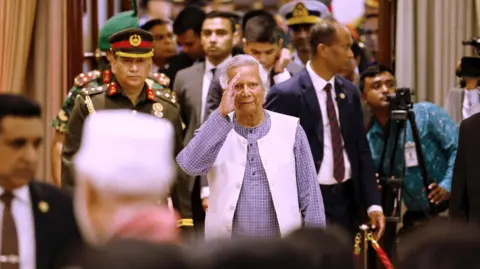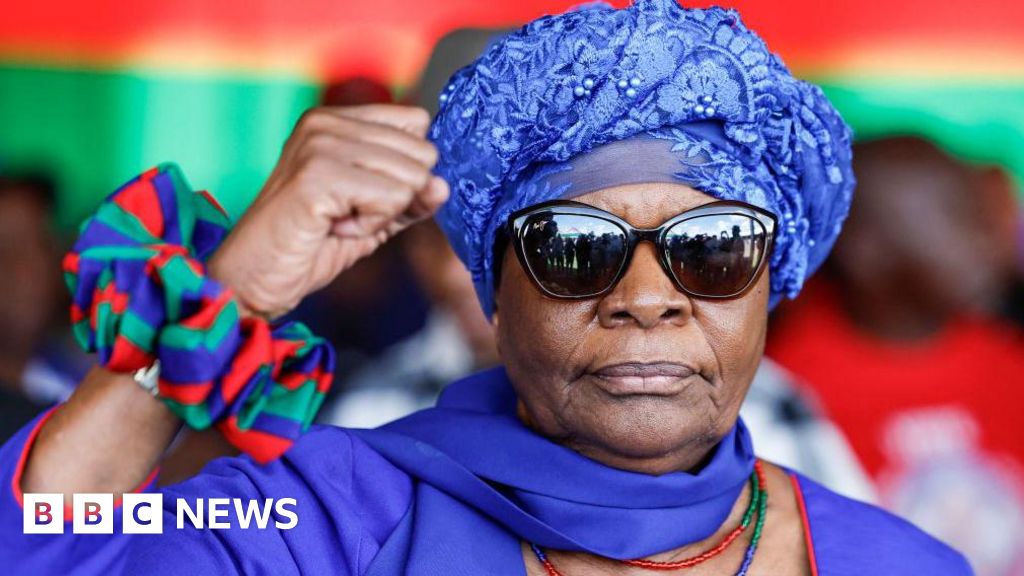ARTICLE AD BOX

 Reuters
Reuters
Bangladesh’s new leader is clear: this was not his revolution, and this was not his dream.
But Muhammad Yunus knew the second he took the call from the student on the other end of the phone last week that he would do whatever it took to see it through.
And the students had decided that what they needed was for Prof Yunus - an 84-year-old Nobel laureate - to step into the power vacuum left by the sudden resignation of Prime Minister Sheikh Hasina and lead the new interim government. He accepted immediately.
“I'm doing this because this is what the youth of the country wanted, and I wanted to help them to do it,” he explains during a private briefing for select journalists at his office in the Jamuna State House.
“It's not my dream, it’s their dream. So I'm kind of helping them to make it come true.”
Prof Yunus was sworn in on Thursday after months of student-led protests culminated in the fall of the government, and is still trying to gauge the scale of the job in front of him.
Most pressing, he says, is the security situation. In the wake of the violence which left more than 400 dead, the South Asian country’s police had all but disappeared - the country’s police union had announced a strike, and traffic was being guided by the students, while hundreds of police stations had been gutted by fires.

 Reuters
Reuters
Some police officers have returned to work, ending a strike sparked by Sheikh Hasina's ousting
“Law and order is the first one so that people can sit down or get to work,” Prof Yunus says.
Monday saw the first glimmers of progress as officers returned to the streets. It is a first step, but security is far from the only problem.
The government entirely “disappeared” after Sheikh Hasina fled the country, Prof Yunus says.
What was left behind after 15 years of increasingly authoritarian rule is “a mess, complete mess”.
“Even the government, what they did, whatever they did, just simply doesn't make sense to me… They didn't have any idea what administration is all about.”
And yet in the face of the chaos is “lots of hope”, Prof Yunus emphasises.
“We are here: a fresh new face for them, for the country... Because finally, this moment, the monster is gone. So this is excitement.”
Reform is key, according to Prof Yunus. It was a simple demand for reform of a quota system which reserved some public sector jobs for the relatives of war heroes, who fought for the country’s independence from Pakistan in 1971, that sparked the protest movement in the first place.
But it was the brutal and deadly crackdown by security services which followed that saw it grow into demands for Sheikh Hasina to stand aside.

 EPA
EPA
Protesters' demands morphed from demands about job quotas in the public service to an end of Sheikh Hasina's government
Reform is desperately needed, says Prof Yunus, pointing to freedom of speech - heavily restricted under Sheikh Hasina’s government, the prisons filled with people who sought to speak out against her.
He himself alleges he was a victim of the crackdown on freedom of speech. An outspoken critic of Sheikh Hasina’s government, Prof Yunus - lauded for his pioneering use of micro-loans but regarded as a public enemy by the former prime minister - was sentenced to six months in jail in what he has called a politically motivated case.
But there are other, more radical, ideas in the pipeline.
Each ministry will have a student seat in it, an acknowledgement of the role they played in bringing the previous administration to an end.
Already, Nahid Islam and Asif Mahmud, students who led the anti-government protests, sit in his cabinet.
And then there is reform of the judiciary. Already, the students have put pressure on the chief justice to resign.
Prof Yunus argues the judiciary was failing to act independently - instead allegedly taking orders from “some superior authority”.
“In the technical terms, he was the chief justice,” he says. “But actually, he was just a hangman.”
There will, he acknowledges, be decisions made that not everyone agrees with, but he hopes it will be better than what has come before.
“Whatever experience I have in my work... So I'm not saying I can run a government. I'm saying that I have some experience of running some organisations. I'll bring that as much as I can. There will be people who like it, people who dislike it. But we have to go through with it.”

 3 months ago
17
3 months ago
17








 English (US)
English (US)